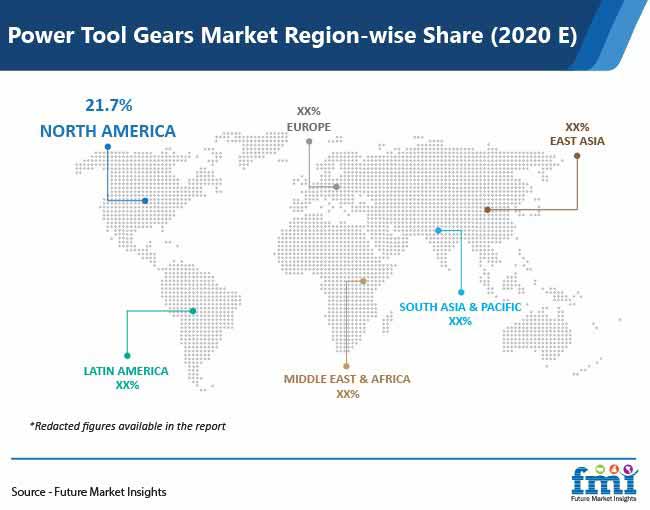According to FMI’s analysis report, the global power tool gears market was valued at US$ 2.6 Bn in 2019, and is estimated to exhibit a CAGR of 5% over the forecast period of 2020-2030, with a strong impact being felt due to the current shutting down of manufacturing industries in emerging markets in the initial period of forecast. However, in the long run, the requirement of new and advanced power tools amongst woodworking personnel and metal fabricators will push the growth of the power tool gears market through 2030.
Due to the global health emergency caused by the outbreak of COVID-19, and subsequent lockdowns in numerous countries around the world, there is sense of economic instability across the globe, which is anticipated to limit market growth to an extensive level. Post pandemic, the power tools gears market is set to witness decent growth, on the back of increasing requirement of faster woodworking and metalworking operations to meet the rising demand for wooden and metal fabricated products in the market.
To Get Sample Copy of Report visit @ https://www.futuremarketinsights.com/reports/sample/rep-gb-7650
Key Takeaways of Power Tool Gears Market Study
- Increasing adoption of automation, better productivity, and easier and accurate operations are vital points propelling the demand and usage of power tools, which is subsequently fueling the growth of the power tool gears market.
- Power tools can be used for hard materials, which are otherwise strong and difficult to work on with mechanical tools. Also, lack of skilled workforce and wage issues are other driving factors for the increment of the power tool gears market.
- Use of spur gears and worm or spiral gears is anticipated to increase over the forecast period.
- The professional end user type segment is likely to retain its dominance in the market due to the requirement of more gear sets. High adoption of power tools for professional purposes is also driving the segment.
- By application, grinding machines are anticipated to progress at a swift pace over the forecast period, with increasing use of sanders and polishers in the market.
“To improve profit margins by increasing production rates and reducing operating costs, effective reduction in workforce is required. As such, many end-use companies are anticipated to increase the usage of power tools over the slated course of time. However, due to the spread of the novel coronavirus, which is nearly shutting down many prominent economies, growth of the power tool gears market will be hindered in the immediate future.”

Power Tool Gears Market: Competitive Landscape
The report provides thorough study on the competition landscape of the power tool gears market, and new strategies and development activities adopted by established market players and new entrants. The global power tool gears market is decently fragmented, with various manufacturers offering identical products. Some of the key manufactures in the global power tool gears market are Porite Group, hGears, Zhejiang Oliver manufacturing Gear Co. Ltd, and Zhejiang Fore Intelligent Technology Co., Ltd. among others.
Prominent market players are investing heavily in research and development activities to manufacture new, strong, and durable products, to improve the quality and assurance of their products, so as to increase their acceptance in the market
Download Methodology of this Report @ https://www.futuremarketinsights.com/askus/rep-gb-7650
Find More Valuable Insights on Power Tool Gears Market:
FMI, in its new market research study, offers an unbiased analysis of the power tool gears market, which comprises global industry analysis of 2015-2019 and opportunity assessment for 2020-2030. The report offers complete analysis on the global power tool gears market through four different categories – end user, gear type, application, and region. The global power tool gears market study provides information of pricing by different life cycle analysis, product life cycles, key market trends, and technologies that are being implemented in the production of power tool gears, besides product adoption in varied end-use industries.
